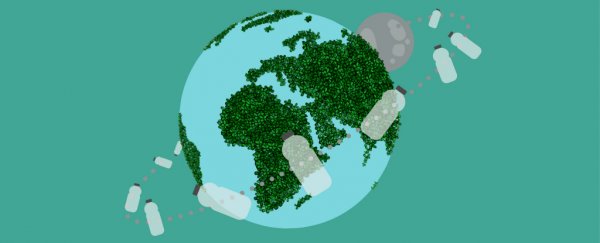During this year's Group of Seven (G7) summit, five of the world's leading industrial powers signed an ambitious environmental charter, promising to protect our shared oceans from plastic pollution.
Under the G7 Ocean Plastics Charter, the UK, Canada, France, Germany, Italy and the European Union (EU) have all agreed to increase plastic recycling by 50 percent, while also working towards 100 percent reusable, recyclable or recoverable plastics by 2030.
The US and Japan were the only nations that refused to join.
In fact, it appears that President Trump was not even present at the meeting. Shortening his time at the summit, Trump reportedly skipped out on the G7 climate change and environment talks, sending a US representative in his stead.
At the meeting, the US also refused to sign a G7 commitment to the Paris accord and a carbon-neutral economy.
At the bottom of the charter is a footnote, stating, "The United States strongly supports heathy oceans, seas and resilient coastal communities. The United States has announced its intention to withdraw from the Paris Agreement, and reserves on the climate related language in the Blueprint."
No other explanation is given for the Trump administration's refusal to sign.
"America—until now—had led on climate," said Fred Krupp, the President of the Environmental Defense Fund.
"Today our president doesn't even care enough to be present. We all must work to restore the USA to a leadership position."
It is unclear why the US has not signed the plastics agreement, but if President Trump's disdain for the Paris climate accord is anything to go by, it is probably because the agreement would require too much industry regulation – something that the Trump administration is loath to enforce.
The US plastics industry is the third largest manufacturing industry in the US, producing 19.5 percent of the world's plastic, employing 1.4 million people and creating about $380 billion a year.
The problems that this industry has created are staggering. Every year, the world produces around 300 million tons of plastic, and every year, 10 million tonnes of plastic winds up in our oceans.
Just like Big Oil, the plastics industry has known about this problem for years.
A 2017 report released last year by the Center for International Environmental Law (CIEL) found that the plastics industry knew its products were pollution the oceans way back in the 1970s. The industry has rejected responsibility and fought regulation ever since.
But no matter how big the environmental issue, the US and Japan (which also boasts a large plastic industry) appear to be unconcerned by plastic pollution. Last year, the White House even rolled back a rule that banned plastic bottles in national parks.

Regulating a huge and lucrative industry like plastics will not be easy, and the G7 is a promising start.
Nevertheless, some environmentalists have said that the charter does not go far enough. Greenpeace International Executive Director Jennifer Morgan has called the plans tepid at best.
"While the leadership to outline a common blueprint is good news, voluntary charters focused on recycling and repurposing will not solve the problem at the source," Morgan said in a statement.
"It's time for the world's largest economies to recognise that we cannot simply recycle our way out of this problem while we keep churning out so much throwaway plastic in the first place. Governments must move beyond voluntary agreements to legislate binding reduction targets and bans on single-use plastics, invest in new and reuse delivery models for products, and hold corporations accountable for the problem they have created."
But something is obviously better than nothing, and while the US lags on federally enforced plastic pollution standards, the rest of the world is stepping up.
The UK recently announced a plan to ban plastic straws, cotton swabs and single-use plastics.
Shortly after, the EU moved to ban ten of the world's worst single-use plastics, including plastic cotton buds, cutlery, plates, straws, drink stirrers and balloon sticks.
Morgan held up the EU's new plastics policy as a gold standard for other countries.
"The newly proposed European Union single-use plastics law clearly recognises that it's necessary to go beyond recycling and move toward bans and producer responsibility," she wrote.
"Today, five G7 leaders have acknowledged the crisis, which is an important step, but that must be met with significant legislative action building on the EU's example."
Nations outside of the G7 are also doing their part. India, for instance, just announced that it would be removing all single-use plastics by 2022.
And, at the beginning of the year, China stopped importing plastic from countries around the world in an attempt to reduce pollution and incentivize other countries to reduce their production of plastic as well.
"Consumer changes on their own won't solve the plastics crisis, as hundreds of billions of dollars from the petrochemical industry are being poured into new plastic production," said Steven Feit, a CIEL Attorney and the lead author of Fueling Plastics.
"We need a global, binding treaty that regulates plastic pollution throughout its lifecycle, from well head production to ocean waste."
While the rest of the world appears to be joining together to fight this global issue, the US is nowhere to be seen.
Science AF is ScienceAlert's new editorial section where we explore society's most complex problems using science, sanity and humor.
